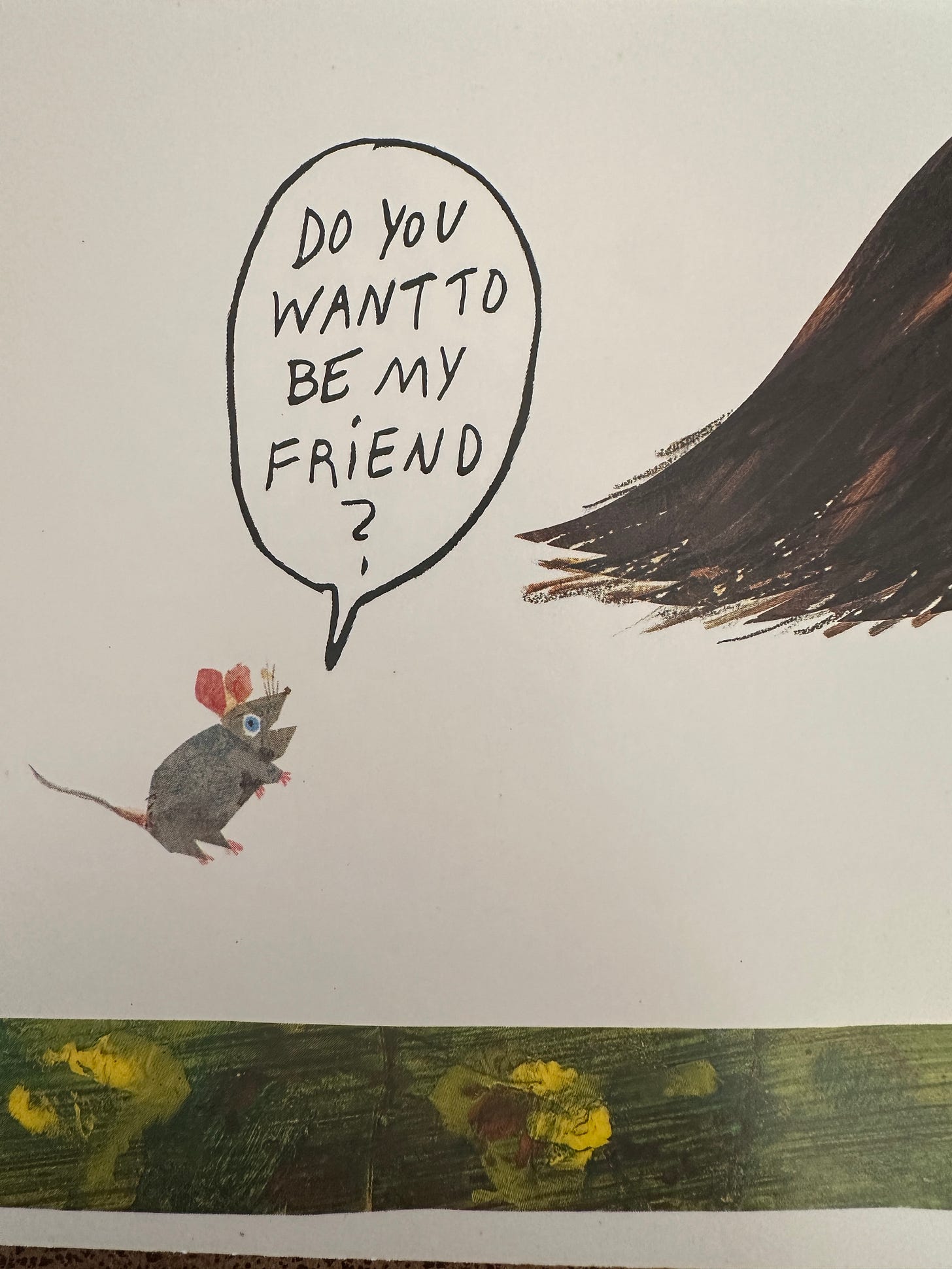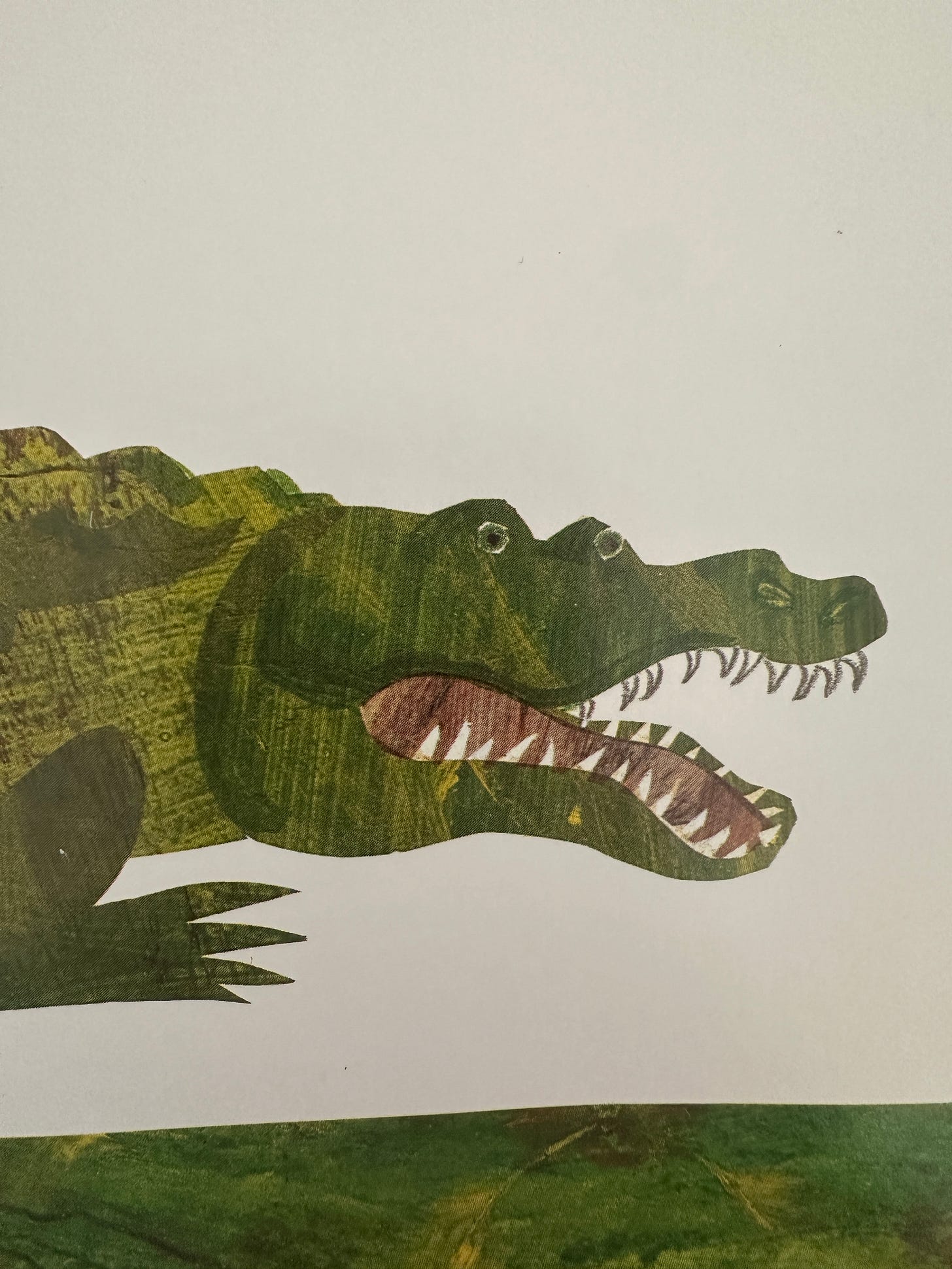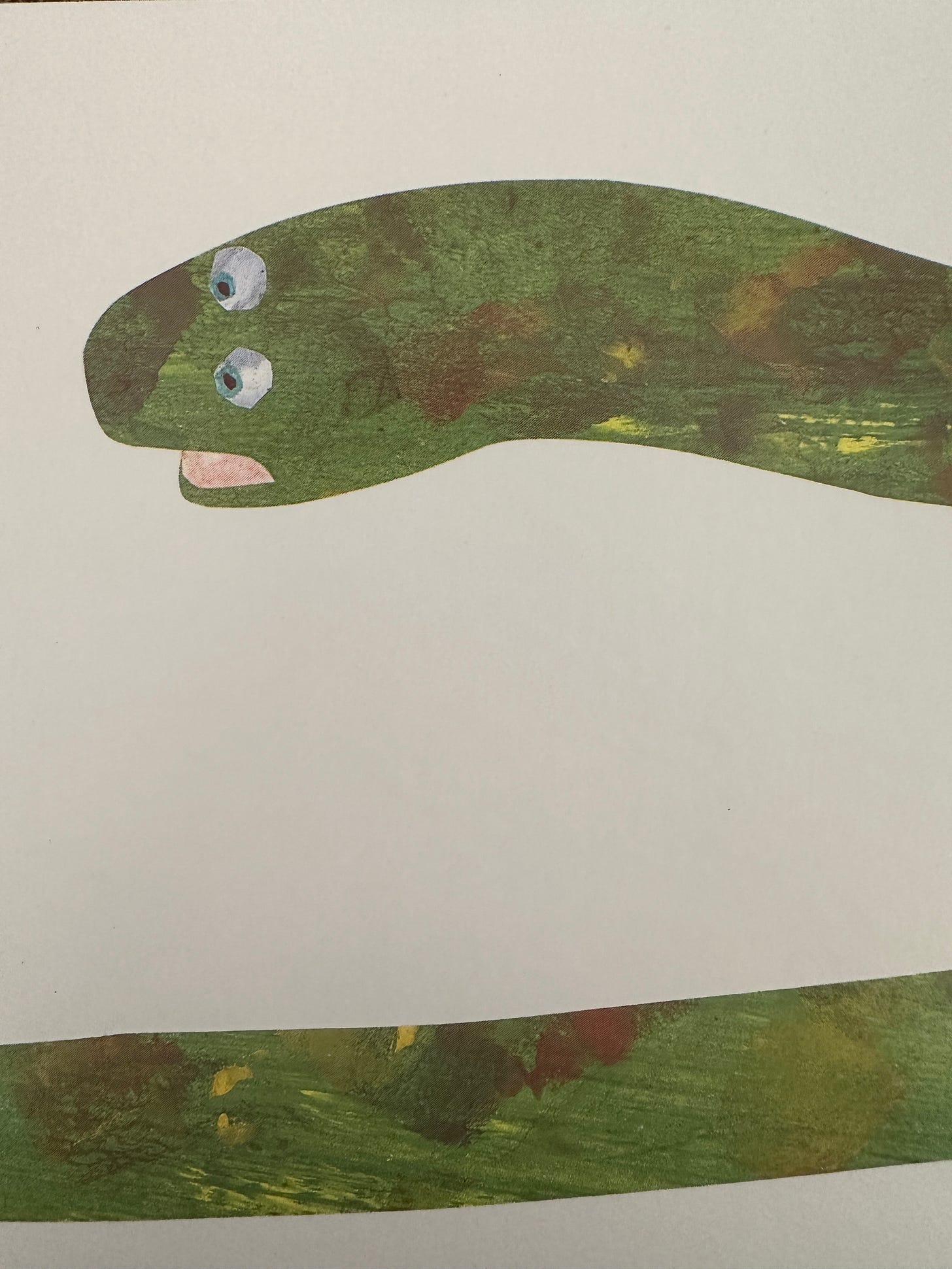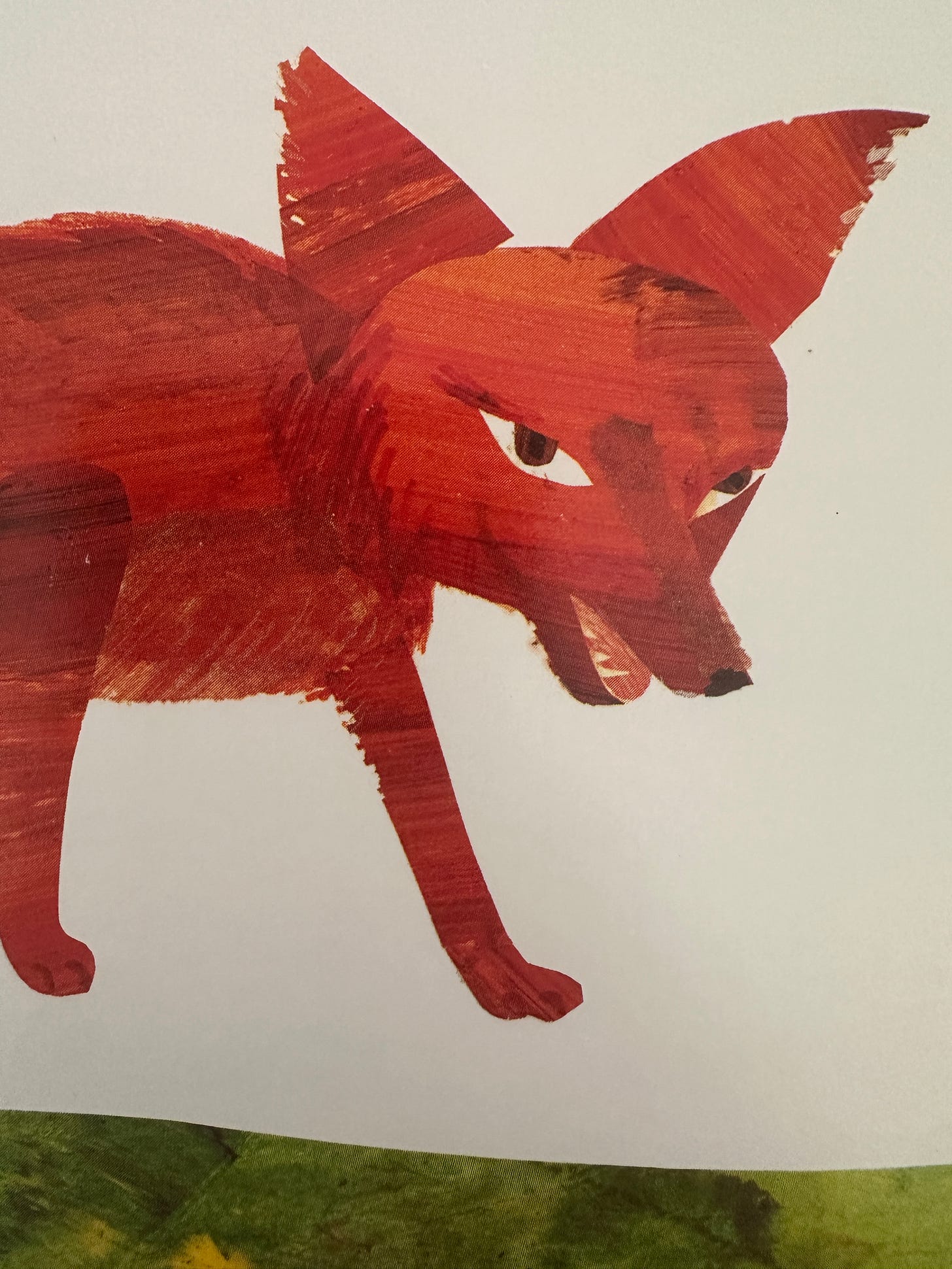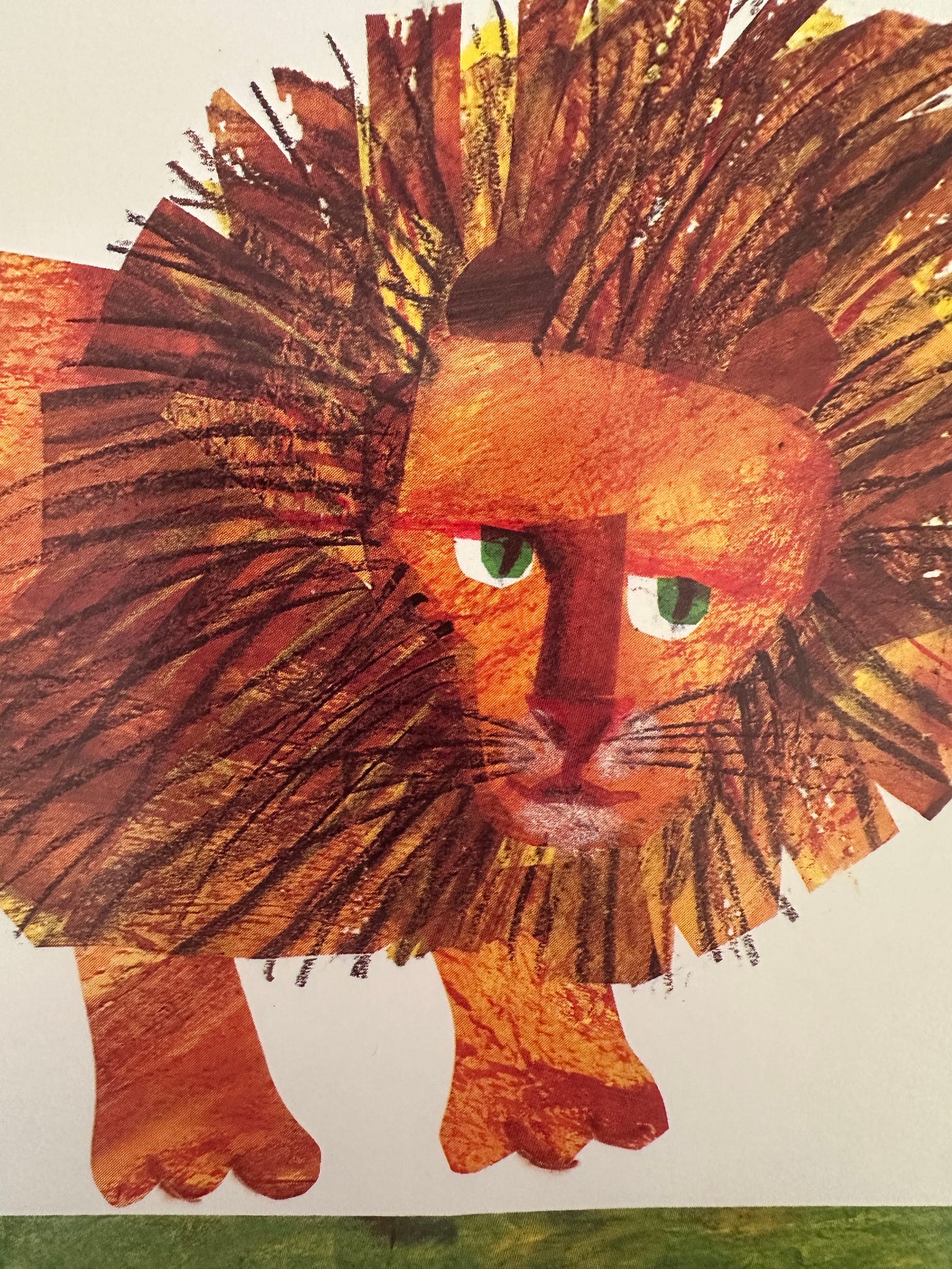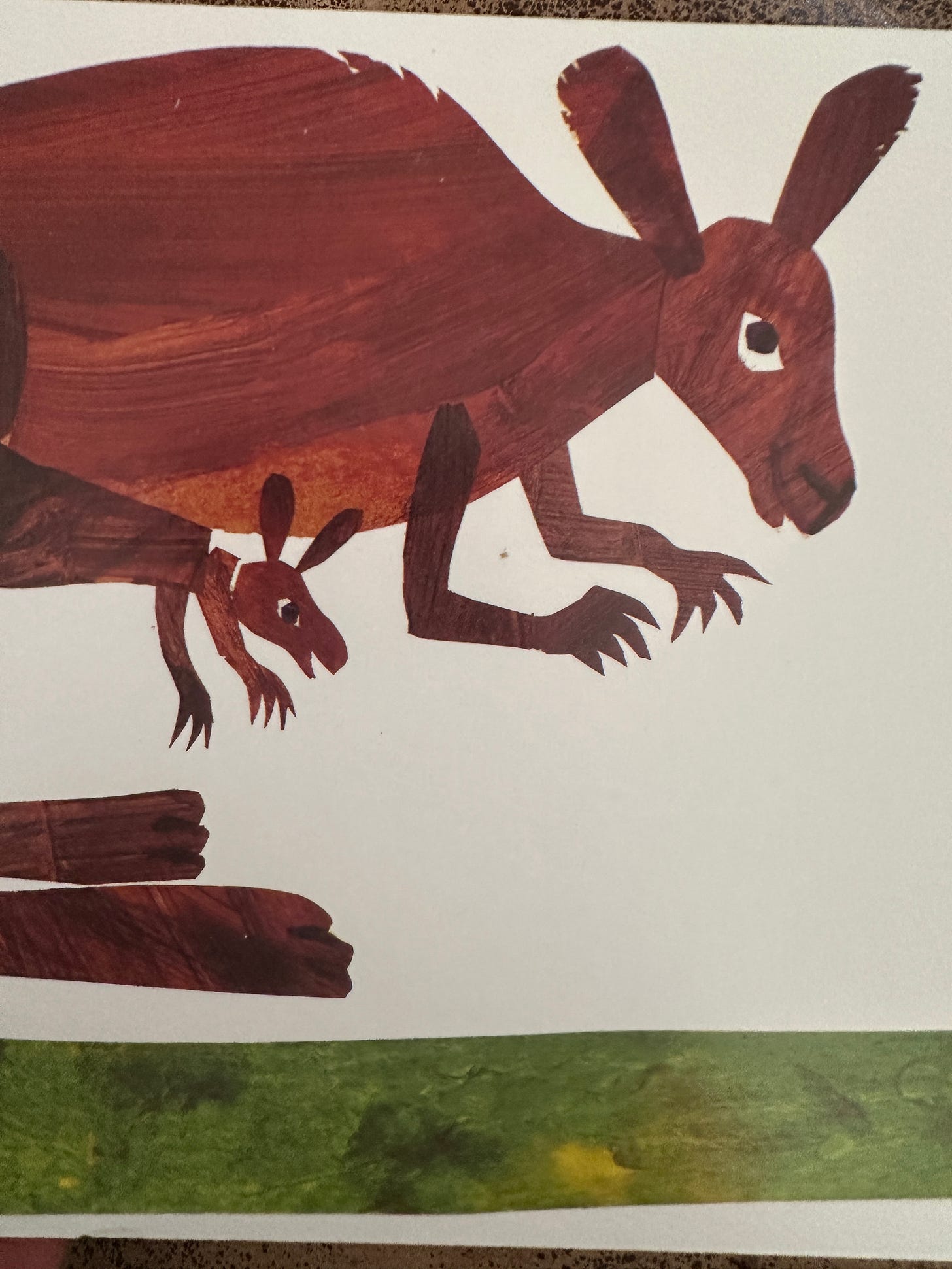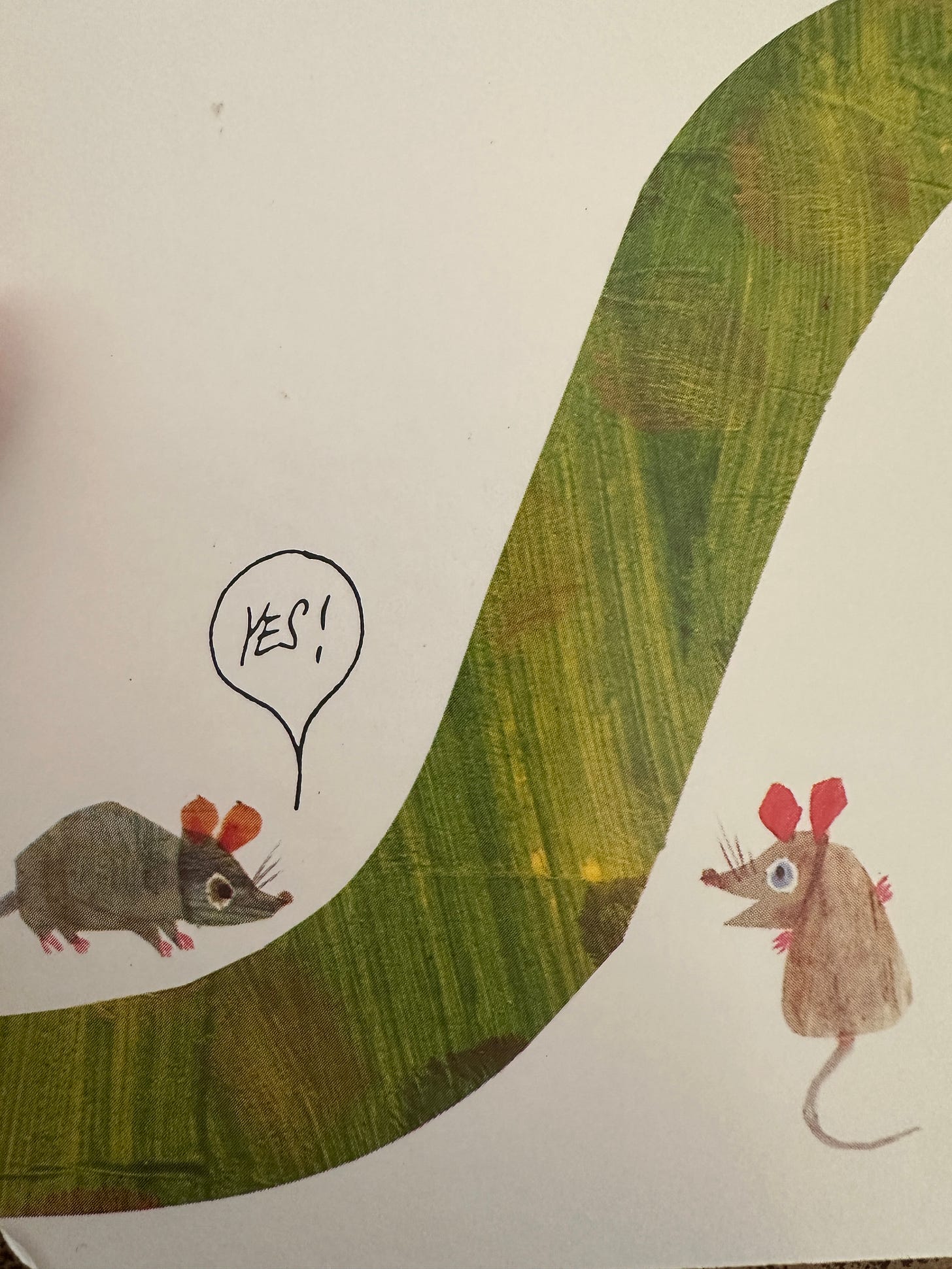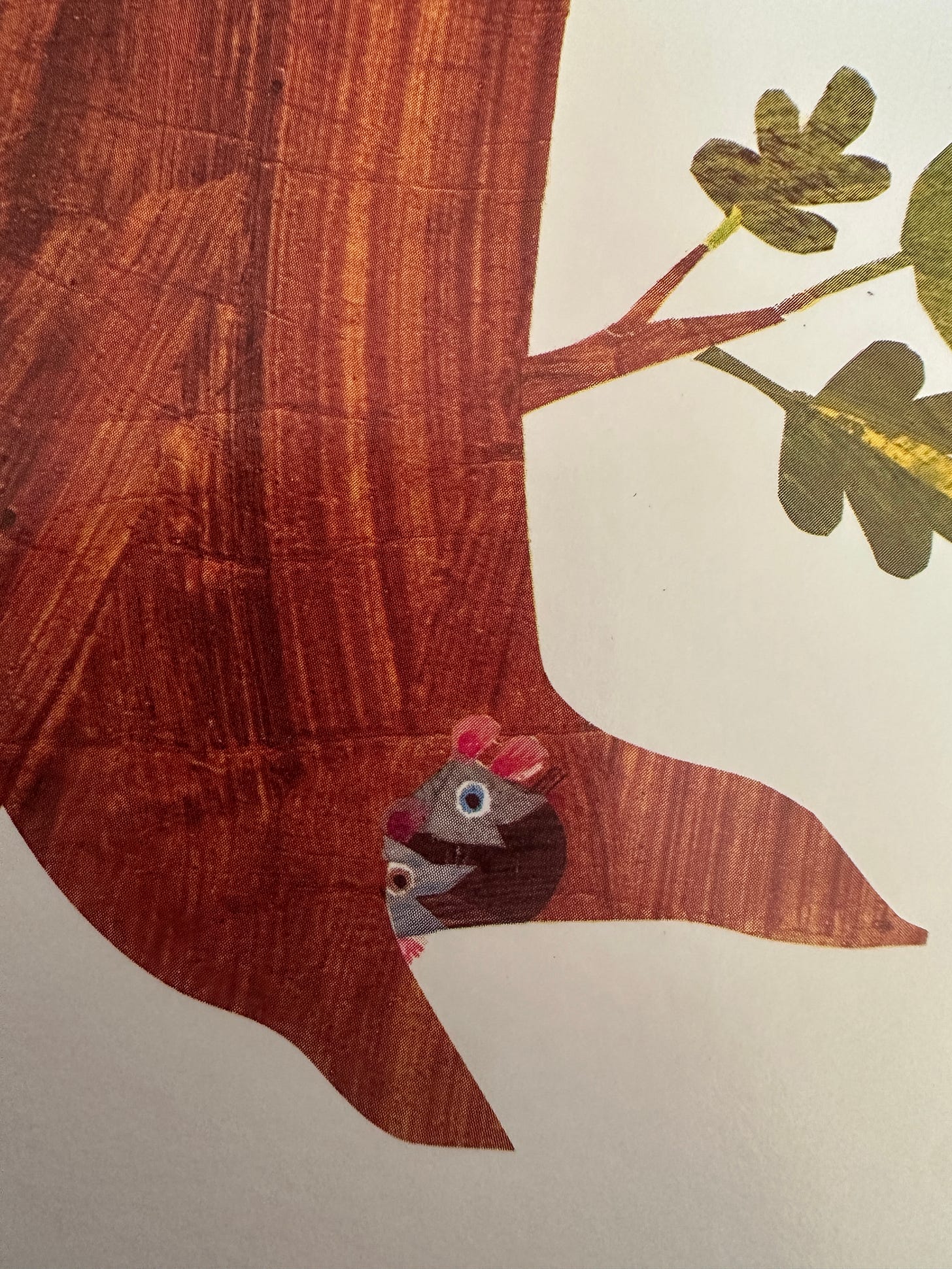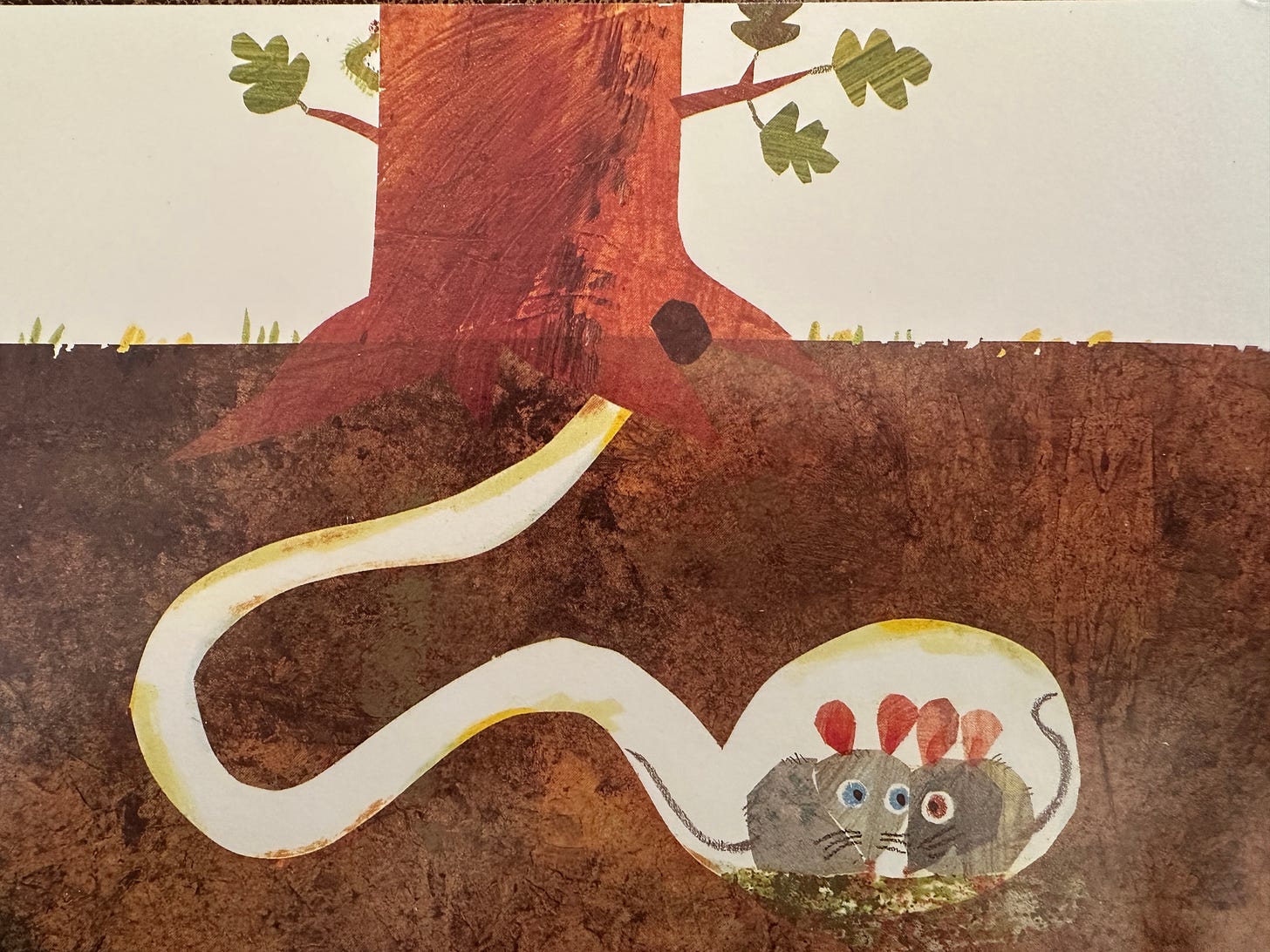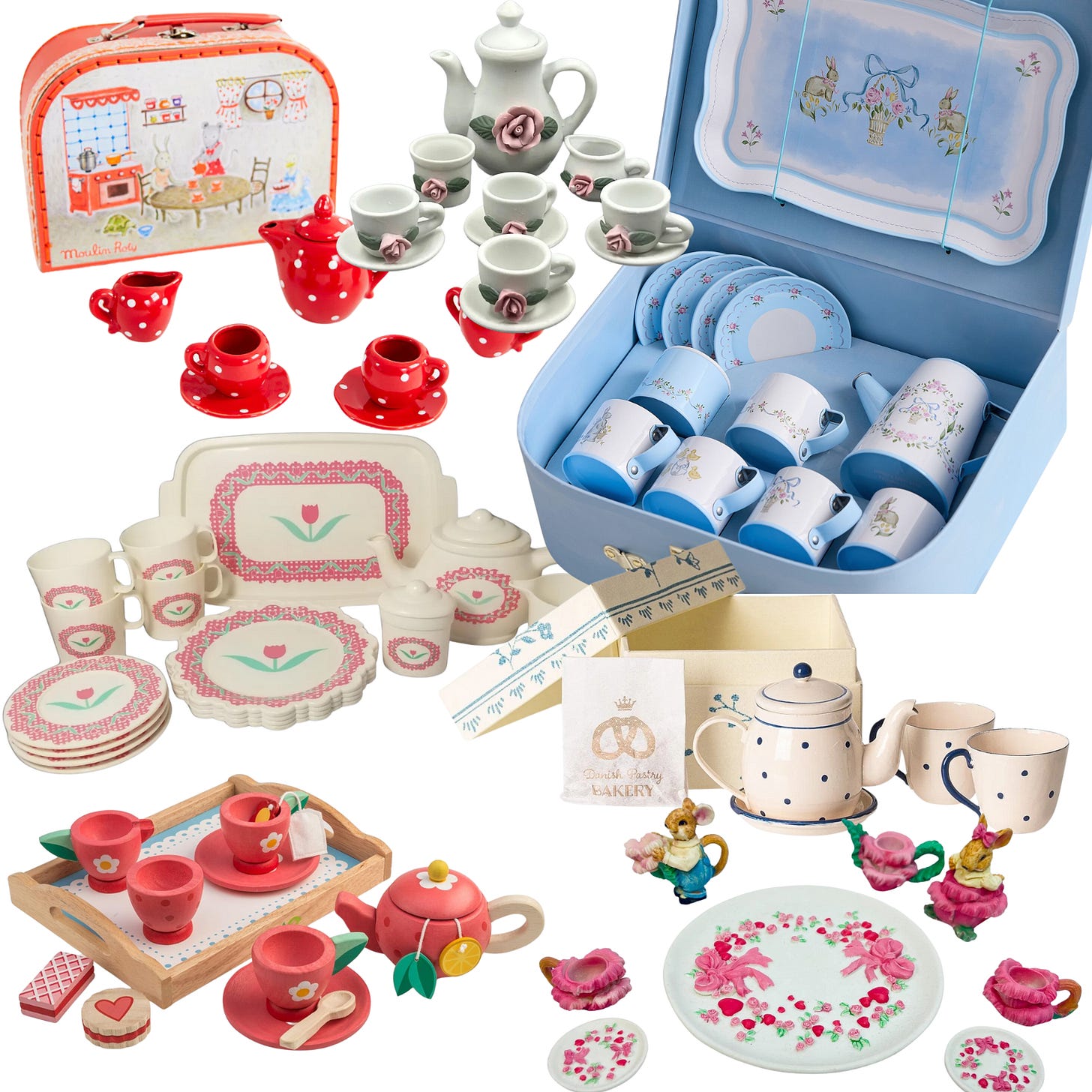Do You Want To Be My Friend?
or what not to do when your toddler gets bit at preschool
Welcome to LOL. A reader-supported publication. Each week, I feature a children’s book, a creative essay, and fun edits to inspire the art of life.
This newsletter is best read in the substack app. If you are reading this in your email you might not see the whole thing. Make sure to click “view entire message”
Subscribe below! and if you like it please share :))
this post contains affiliate links to amazon, etsy, and eBay
DO YOU WANT TO BE MY FRIEND?
by Eric Carle
Sometimes, I avoid reading this book to my children. Sometimes, I face my discomfort, read it, and enjoy the experience.
Since there are only a few words, you can make up the story as you go along. That journey can be uncomfortable, scary, and rewarding.
Kind of like parenting.
MOTHERHOOD
by Do You Want To Be My Friend?
Or what not to do when you’re a survivor of domestic violence and your toddler gets bit at preschool:
*trigger warning: domestic violence
1. Don’t pull her out of school
2. Don’t think about changing her school
3. Don’t blame the parents of the kid that bit your kid for the biting. Don’t blame them in your heart or out loud to anyone.
4. Don’t try and “help” by asserting your opinions on everyone involved and everyone not involved.
5. You’ll want to but don’t blame the teachers.
6. Don’t yell at the teachers, the school director, or the mom who manages admin at the front desk. In fact, don’t read any newsletters from the school right now.
I know.
7. Don’t stick your kid in front of Sesame Street for days to “take and give space” and order fried shitty takeout “to make life easy” while you stomp around ranting about how unfair the world is so even the cat is afraid to go near you.
8. In general, don’t make the whole thing about yourself (your kid is the one who has a physical and emotional wound) by spilling yourself all over the house.
9. Definitely, don’t let anxiety take hold of the controls so much that you don’t sleep and you catch a green snot, head in a bell jar, cold.
None of this will protect the little girl inside of you who no one listened to.
You’ll feel like the bull you are being, becoming your abuser and making it all worse.
Most importantly:
10. Don’t project onto the kid that bit your kid that they need the help you once needed. They don’t. Even if they do, you can’t help them when you’re like this.
11. Don’t be defensive when people you trust point this projection out.
12. Don’t ignore your impulse to bite back. Don’t bite back. Don’t deny it if you do it.
Don’t put emotional distance between you and your kid.
You might want to do all this but just don’t.
What to do when you’re a survivor of domestic violence and your toddler gets bit at preschool:
Take a deep breath
Take a few more deep breaths
More breathing
More.
Breathe for a week.
…
The day your kid gets bit — Let your spouse or someone else talk to the school and the teachers. Let your spouse or someone else look at the ouch report. Don’t look at the ouch report. Call it something else like “a letter from the school about class today.”
If you are the only adult around, tell the school you are a survivor of domestic violence, and you simply cannot hold the ouch report at this moment and to please mail it to your house. And say thank you.
Crying is okay. Crying is best at home if you can help it.
Yelling is not okay.
Let go of the entitlement that says you are owed something for the pain.
Accept that no one owes you anything.
…
Breathe, turn your phone off, stay home, take a shower, eat, have some tea, and accept the homemade cookies your neighbor offers.
You might hear from the parents of the kid who bit your kid. You might not. Remind yourself that no matter how good of a friend they are, it’s not their job to soothe you.
They are busy with battles you can’t see. You’re not ready to talk yet.
First, can you soothe yourself?
…
Look at your kid. Sit with her. Play the games she wants to play like turning into whales on the ocean floor. Play how she wants to play.
If you can’t stop looking at her injury and need to use Sesame Street, watch it with her and talk to her about the characters. Tell your kid you love her. Tell her again. If it’s okay with her, stay physically close. Offer extra cuddles. Laugh at things she thinks are funny. Keep her favorite snacks close.
Try not to look at her wound too closely. I know the skin is broken, the bruise is darkening. Try not to look, okay?
It’s okay to cry, but not in front of her. She doesn’t need your tears. Look in her sparkling eyes. Look at her strong knees.
Feeling badly about the world and how painful life can be is okay.
Feel that. Tell yourself it’s okay to feel that.
See that she is healing fast.
…
The day after the bite. You will want to take all kinds of action.
So, get up. Brush your teeth, experiment with your new contacts that are so weird and hard to put in and take out, shower with your favorite soap, ride the bike, make both your kids a yummy, fun breakfast with a smiley face in it, hug your husband and tell him you’re proud of him, get the laundry going, wipe down the table, open a window, boil water for tea, make your kids lunch and snack extra healthy yummy and thoughtful, turn the seat heaters on in the car, put your kid’s pants and your pants on one leg at a time, pack yourself tea for the road.
Accept that all this action is enough action. This is your quiet rebellion. Your anecdote to violence. These actions you are taking will prepare your kid for whatever new bites are coming her way today. When you remember she will get bit again take a big deep inhale and remember to exhale too.
If you still want to take action,
ask your kid how she is doing today.
She might tell you now, “XXX bit me!”
Breathe.
Ask her how it made her feel to be bitten. Let her be sad. Let the hurt wash over you, too. Hold space for her. Stay really quiet.
Say, “I hear you saying XXX bit you. That sounds really hard. XXX must have been so upset. Biting hurts. It’s not your fault.”
Give her a lot of space over many days because she might need to talk about it at random times — she might try to explain how she is doing, and she may need you’re help because she might be confused and
listen, you have to be really, really quiet to hear her confusion.
I know it’s loud in your heart right now.
So,
cancel all other important conversations for the next week. Month if you need it.
Take another deep breath
…
After a bit — not right away — wait to talk until you can be mindful of how you angry you sound — tell your therapist, your close friends, and the teachers if they are loving enough to ask
Say “Hello. I am a trauma survivor. I am hurting. I am a survivor of domestic violence as a child and as an adult. I am activated. My inner child is activated. I can’t talk about this from any other part of me right now and I want to talk so I don’t feel so alone. Thank you for asking. I’m having a lot of overwhelm. Is there any support you recommend for a human like me?”
If you’re lucky they might send you some articles.
The articles might frustrate you. Read them anyway. Believe the research. It is common for kids to bite each other. Not everyone experiences biting the same. The biting itself is a form of expression. It doesn’t have to mean anything. Yes, it could mean something. But it might not.
You’ll read that biting is unacceptable, but you won’t know what that means.
Even after you read the articles, if someone asks how you are dealing with what happened, it is safe to say: “I am raw, and I am hurting, and I am still processing.”
That is enough of an answer.
Listen, I know you want to process quickly so it doesn’t hurt so much — so you don’t have to admit you’re not allowing space for your kid's pain because
it all hurts so much.
Because you’ve never seen her hurt before. Not like this.
Because you still need to do DBT and tapping and keep releasing the trauma from your fascia in yoga but life is moving so fucking fast.
…
Be prepared that people will have heard what happened, and they might ask how your kid is. Some of them are asking because it’s polite. If you get that sense, say, “She’s okay. We’re giving her room for her feelings.” That is enough of an answer.
You might reach out to other parents and tell them what’s happened.
If someone is genuinely interested and you can tell they want to support you, and they ask how she’s doing tell them…
She’s behaving differently. Angry. I’m not sure if it’s my fault because of how emotional I feel, if it’s her reacting to the violence she experienced, or if it’s both or something else. Maybe it’s the damn head cold, or she’s constipated or thirsty?
She’s been taking it out on her baby sister, and it’s fucking heartbreaking.
The chain reaction of how we can impact one another is playing out before my eyes, and it’s a lot to watch. Someone felt hurt. They hurt her. She’s hurting someone — it goes on and on.
Wait. No. Don’t say any of this. That’s confusing, and an overshare.
Tell whoever is asking, “I’m not sure how she’s doing because the question is confusing because — she got bit by her friend, and she’s walking around with a physical wound. So when you ask me how she’s doing, it’s almost dismissive that something big happened.”
…
It’s almost like —
That one time when he threw me by my hair into our hallway on Bowery with the shiny, big black bags of trash full of his empty beer bottles, and I said I wouldn’t get back into his arms until my cuts and bruises healed, but we lived together so I had nowhere to go and it felt like my fault
then
I wrote a poem about that moment and submitted it to a literary magazine —
Dinner Time by Jillian Federman 2018
on this sturdy redwood desk
my favorite hat
sensitive stitched in cadmium yellow
makes me forget the time
my limbs smashed into fictile bags of exhausted glass bottles
as you flung me out of your studio by my mane
The landing of the building
neighbors with fists full of cooked chickens and crudite
I collected my clumps of whiskers
waited.
crawled back in.
barred my bones and begged for another
but Bowery lit your tears neon
and those ethidium bromide stained glasses began to crack off your cream cheese face
I tripped over your army of bottles bedside
visited with the place you smashed my head to begin with
the skin of my paws burned as I removed your frames
and we wrapped up the poison
tucked it away between the pillows
hunger burning my bruises into scares
I miss new york
and when my poem was rejected, the feedback from the editor was something about how it was clever to write this way about a stray cat —
…
Asking how she’s doing after her friend bit her is almost like —
That time, I watched him throw her down the flight of stairs when she was pregnant with my sister, and he didn’t leave a single bruise on her.
…
It’s almost like —
what does it matter how she is doing? What must she be for this situation to feel okay? How could we know when and how she will remember this? How do we know what feels like violence to her? She got hurt, and it wasn’t her fault, and I couldn’t protect her.
…
More breathing.
…
Sorry, let me start over —
If people ask how she’s doing after being bitten, tell them the truth and say, “I think she’s processing it, and it’s hard to answer because she’s a complicated person who doesn’t have all the language or brain development and…”
No.
No.
Sorry, this is hard.
…
If people ask how she’s doing after being bitten, say, “Hey. It means a lot that you’re asking. We’re working on resilience. Thank you. How are you?”
…
Anyway, now that you are ready,
call the parent of the kid who bit your kid.
…
Call them, and leave a loving message if they don’t answer.
Wait to hear back.
When you get on the phone, ask them how they are doing.
They might ask how your kid is when you start talking about the incident (hopefully, you won’t have to spend an hour unraveling your messy reaction because you’ll have read this first). So you say —
Hey. It means a lot that you’re asking. We’re working on resilience. Thank you. How is your kid?”
They might tell you something like, "She's fine. Biting is common, and she's okay, and it's not a problem we're concerned about."
You’ll get flashes of court hearings and being on the witness stand testifying that things happened when there is very little proof.
Breathe.
It's okay to respond to this by calmly saying, "I'm feeling activated and can't hear that right now."
If you're lucky, like I am, the parent will understand how hard this all is and be generous enough with all they have going on to care that you're not ready to hear the truth.
The truth is — this is life.
Sometimes, people hurt other people whether they mean to or not and there’s nothing anyone can do.
Now —
See if you can hear the parent and accept what they say. Tell them you've regulated and ask them again, "How is your kid doing?"
They might say, "I know this is uncomfortable and hurts, but it's also okay. Everyone is safe."
Believe them. Even
keep talking and exchanging experiences together if you both have time.
Consider making the time if you don't.
It's not easy to navigate. But you will do beautifully.
Make jokes mid-conversation about how your baby drank from the toilet.
Let them tell you how much sleep they need.
Don't offer each other any advice.
This is just what life is like right now. Can you hold this discomfort together?
Yes, you can. You can model hard things for your children.
Eventually, if you’re lucky like me, the conversation with the parent of the kid who bit your kid will be so healing that you and the parent will stop talking about feelings and come up with an idea.
A big idea.
Yes.
Let’s get the kids together so they can heal !
You’ll leave the husbands and the babies in another room so you can guard against overwhelm and focus.
Yes, let’s get the kids together in a safe, quiet, resonant space so they can heal.
You’ll have a playdate (!) and some small talk.
You know what?
Let’s make it special for them and us.
Throw the kids a tiny tea party for two. For four.
…
Do you need the fairy costumes, tea sets, and homemade scones?
You might not.
But goddammit I do.
TEA PARTY FOR TWO
by Do You Want To Be My Friend?




